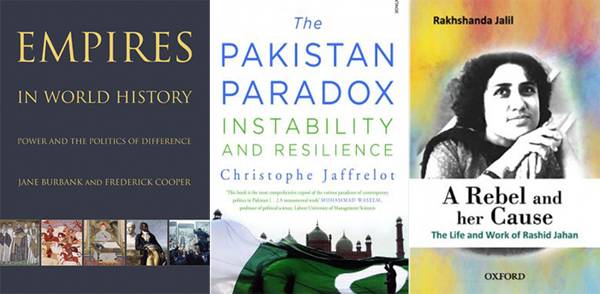
A Rebel and Her Cause: The Life and Work of Rashid Jahan
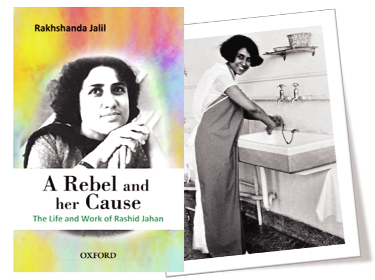
Rakhshanda Jalil
Oxford University Press [hardback], 2015
PRs 1,495
Despite a brief and slender literary career, Rashid Jahan blazed a trail in the progressive firmament of pre-and post-Independence India. Doctor, writer, political activist and crusading member of the Communist Party of India, Jahan was radical in a way that defied all expectations – from her social class, her comrades, her peers and colleagues.
In a remarkably perceptive, richly detailed account of this pioneering woman, Rakhshanda Jalil offers readers an unusual document: a warm and informed biography – based on archival material, extensive interviews and critical commentaries – together with fine translations of Jahan’s best known stories and plays, including the collection Angarey (which Jahan coauthored with three male peers). By subtly counterpointing Jahan’s political purpose with her literary and professional skills and sensibilities, Jalil paints an arresting portrait of a woman deeply and passionately engaged with the great debates of her time: fascism, imperialism, nationalism, socialism and feminism.
Jalil’s biography fulfills an important service in recognizing the life of one woman who “single-handedly paved the way for other women writers.” Equally important, writes Jalil, “She opened a window of immense possibilities for young Muslim women.” In bringing alive the life and work of a vivacious, engaged women whose epitaph in Moscow reads, “Communist Doctor and Writer”, Jalil traces a long chain of writers linked by a sense of injustice and desire to bring about change.
The Pakistan Paradox: Instability and Resilience
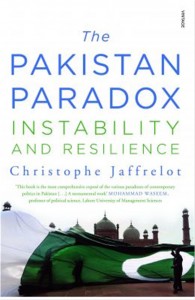
Christophe Jaffrelot
Oxford University Press/Hurst [hardback], 2015
PRs 1,595
Pakistan was born as the creation of elite Urdu-speaking Muslims who sought to govern a state that would maintain their dominance. After rallying non-Urdu speaking leaders around him, Jinnah imposed a unitary definition of the new nation state that obliterated linguistic diversity. This centralization – “justified” by the Indian threat – fostered centrifugal forces that resulted in Bengali secessionism in 1971 and Baloch as well as Mohajir separatisms today.
Concentration of power in the hands of the establishment remained the norm, and while authoritarianism peaked under military rule, democracy failed to usher in reform, and the rule of law remained fragile at best under Zulfikar Bhutto and later Nawaz Sharif. While Jinnah and Ayub Khan regarded religion as a cultural marker, since their time the Islamists have gradually prevailed. They benefited from the support of General Zia, while others, including sectarian groups, cashed in on their struggle against the establishment to woo the disenfranchised.
Today, Pakistan faces existential challenges ranging from ethnic strife to Islamism – two sources of instability which hark back to elite domination. But the resilience of the country and its people, the resolve of the judiciary and hints of reform in the army may open a new and more stable chapter in its history.
What people are saying: “… the most comprehensive exposé of the various paradoxes of contemporary politics in Pakistan: the riddle of a Muslim nationalism in British India, the problematic democratization of the post-military state in the absence of a strident civil society, and the progression of Islam from ideology to policy, underscored by a widening chasm between Islamists and modernists, between Muslims and non-Muslims, and between Sunnis and sectarian minorities” (Dr Mohammad Waseem, Lahore University of Management Sciences).
Departures and Arrivals
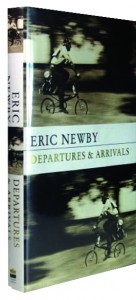
Eric Newby
The Lyons Press [hardback], 1999
PRs 870
Eric Newby got the travel bug from his parents, who would leave him with a housekeeper for months at a time when they went off to market their fashion “productions”. But he took the habit farther afield and for far longer than anyone could have imagined, and in the process developed an audience devoted to his witty travel tales. Now in his 80s, the venerable English travel writer still pedals a cycle or bounces across a desert on a jeep whenever the opportunity presents itself, for, as he notes, it might well not recur.
In this selection of short pieces, Newby focuses on his most enduring memories of departures and arrivals, beginning with his regular walks “up to the bend and back” with his mother in his childhood village of Barnes, England. With abundant detail and his trademark self-deprecating humor, he takes his readers on one of the last journeys of the Orient Express, into the world’s biggest opal field in South Australia (where miners live in the “unimaginable horror of corrugated iron huts” in 140° temperatures) and on to Tuscany for the mad two-minute horse race known as the Palio where horses and riders are regularly maimed or killed.
In his 70th year alone, Newby cycled from Rotterdam to Dijon, traveled to northern Rajasthan for the full moon of Kartik – when tens of thousands of Hindus try to bathe in the sacred lake at the same time – and then to the biggest cattle fair in all of Asia, where he describes in delightful detail the twice-daily bathing of the elephants. Two years later, he decided to ride his bike along the meridian two degrees west of Greenwich in bleak November weather because it was the only time of year he could stay at bed-and-breakfasts without advance reservations.
During a visit to China, he irreverently describes the embalmed Chairman Mao this way: “Lying there, with only his face visible, he looked like an over-sized omelet from the McDonald’s across the way at the south-west corner of Tiananmen Square.” As for him, he’s busy being overtaken on his made-to-order touring bicycle by elderly Dutch ladies “mounted on bikes that looked like two harps welded together.” With his ironic and endearing sense of humor and his willingness to go absolutely anywhere, Newby makes the perfect traveling companion.
Empires in World History: Power and the Politics of Difference
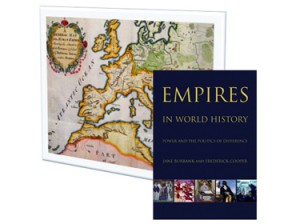
Jane Burbank and Frederick Cooper
Princeton University Press [hardback], 2010
PRs 4,230
Empires – vast states of territories and peoples united by force and ambition – have dominated the political landscape for more than two millennia. Empires in World History departs from conventional European and nation-centered perspectives to take a remarkable look at how empires relied on diversity to shape the global order. Beginning with ancient Rome and China and continuing across Asia, Europe, the Americas, and Africa, Jane Burbank and Frederick Cooper examine empires’ conquests, rivalries, and strategies of domination, with an emphasis on how they accommodated, created, and manipulated differences among populations.
Burbank and Cooper examine Rome and China from the third century BCE, empires that sustained state power for centuries. They delve into the militant monotheism of Byzantium, the Islamic caliphates and the short-lived Carolingians, as well as the pragmatically tolerant rule of the Mongols and Ottomans, who combined religious protection with the politics of loyalty. The authors discuss the influence of empire on capitalism and popular sovereignty, the limitations and instability of Europe’s colonial projects, Russia’s repertoire of exploitation and differentiation, as well as the “empire of liberty” – devised by American revolutionaries and later extended across a continent and beyond.
What people are saying: “This is a very big book on an enormous subject. For anybody who assumes imperial history is all about Britain, with some 19th-century European imitators on the side, it will be something of a shock. For Burbank and Cooper, imperial history is world history. The authors also make a point popular among academics who hate the idea of borders keeping the underprivileged out of rich nations, that empires can be confederations of different peoples united by an all-encompassing ideal” (Stephen Matchett, The Australian).

